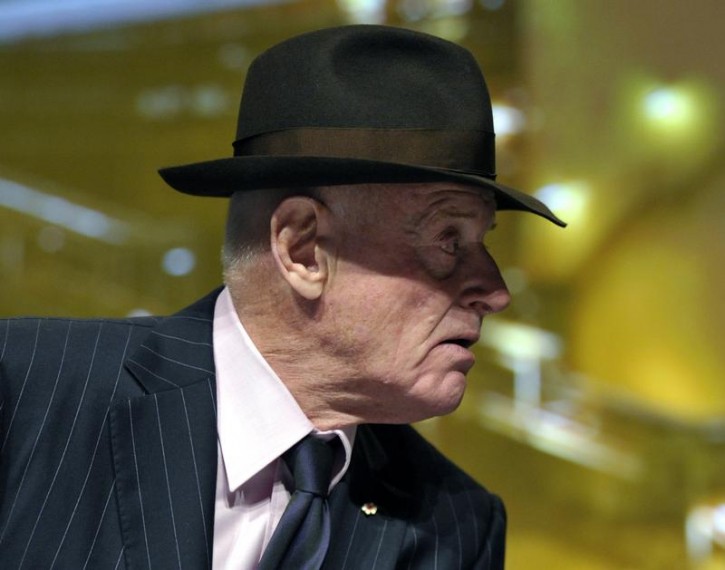Delivering His Own Destiny
"[My grandfather’s] total destruction was complete. He lost his name, his home, his wealth, his status, everything he had and he barely, barely, by unique feat of almost unbelievable fortune, planning and ability, managed to save probably amongst a handful of patriarchs, 14 members of his direct family – children, grandchildren, including me – away from the Holocaust and brought us as nameless refugees living off charity in Switzerland."
"We were taken to a gym [at the Engineering Department, University of Toronto]. And in the gym were trestles, wooden tables set with all kinds of milk, chocolate milk, regular milk, ice cream, hot dogs, hamburgers, doughnuts. … [Back home] hunger was tangible. … The whole thing became a totally unreal, surreal experience."
"I arrived in this place [Canada] not speaking the language, not knowing a dog. This is a country that does not ask about your origins; it only concerns itself with your destiny."
Peter Munk, Canadian extraordinaire, 1927 - 2018
/arc-anglerfish-tgam-prod-tgam.s3.amazonaws.com/public/EK56LN4AXZFX7A5GWG5MC3OZ7U.JPG) |
Peter Munk speaks in Toronto in this 1994 file photo.
Roger Hallett/The Globe and Mail
|
When the German military occupied Hungary in June of 1944 the Munk family was, along with all other Jews shoved into the confines of boxcars, trains heading for Germany, accompanied by Nazi SS guards to ensure none of the 1,500 Jews in that transport including the Munks managed an escape. The Munk family train was marooned eventually in Bergen-Belsen for weeks. But where most trains that entered the camp carried Jews who would be summarily exterminated in its gas chambers, this train sat there, waiting.
Awaiting the results of negotiations to determine whether and who among them might be allowed to escape death. Finally, families on board that transport were spared death, for vast ransoms had been paid to Nazi Germany through the auspices of the U.S. Jewish community. The Munk family itself surrendered gold, bank notes and jewellery to convince the German authorities to allow them to save themselves. And in August, 1944 the entire family arrived safely Switzerland.
And there, sixteen-year-old Peter Munk went on a tangent of boyish recreation; "I went on long skiing holidays with friends up in the mountains", he told a biographer. "I made enough money of my own to pay for tea dances and entertain all the dates I wanted". Until his father told him "This can't go on. You're going to dances instead of promoting your career". His mother who had been divorced from his father before the Hungarian occupation and was not with the family had been sent to Auschwitz. She survived her ordeal.
And convinced her son from Budapest, where she had returned after the war, to go to Canada where an uncle lived. And so in 1948 he sailed from Liverpool to Halifax and went on to Toronto where he attended high school, learned to become proficient in English and finally won acceptance to engineering at the University of Toronto. His uncle gave him tuition money and the young man wasted it. But then took a job picking tobacco to earn back his tuition.
He ended up being a spectacularly natural businessman. He built and controlled Barrick Gold Corp. which became the world's largest gold producer. And he also built a real estate empire, TrizecHahn Corp. Prior to that, in 1958 he and a partner in Toronto established Clairtone to build high-fidelity equipment distinguished by their sleek, Scandinavian-style wood cabinets, endorsed by none less than Frank Sinatra, Hugh Hefner and Sean Connery.
While this man acquired his business acumen, his reputation and great wealth, hob-nobbing with royalty, celebrities and entrepreneurs of great renown, he was also busy disposing of some of his riches. He is known to have been responsible for charitable donations to a total of over $200-million. He did observe, however, that this amount would be dwarfed in the future through his will when the time came for it to be probated.
His generosity funded the Peter and Melanie [his second wife] Munk Cardiac Centre at Toronto General Hospital, the Munk School of Global Affairs at the University of Toronto, and the semi-annual production of the Munk debates, featuring high-profile, distinguished guest speakers.
One of his biographers, Peter C. Newman, another alumnus of the University of Toronto, and himself a man of Jewish European parentage, born in Vienna, Austria, had emigrated to Canada in 1940 as a Jewish refugee from Nazi-occupied Czechoslovakia.
Summing up what motivated Peter Munk, Newman wrote: "His motives aren't as innocent or uncomplicated as making money. It's restitution, redemption, revenge -- the three great Rs in Peter Munk's life."
 |
| Barrick Gold Corporation Chairman Peter Munk leaves the annual general meeting of shareholders in Toronto May 2, 2012. REUTERS/Mike Cassese |
Labels: Businessman, Canada, Holocaust Survivor, In-Memoriam, Peter Munk, Philanthropist
0 Comments:
Post a Comment
<< Home